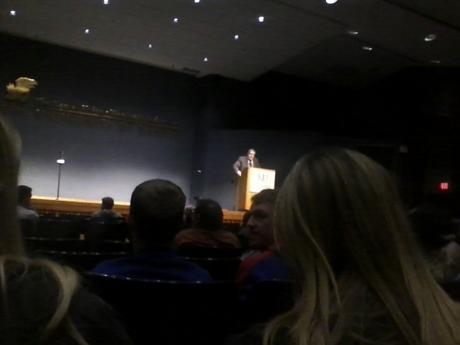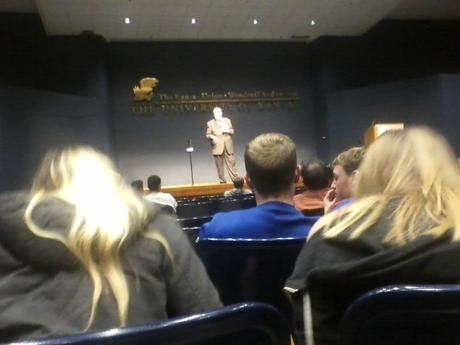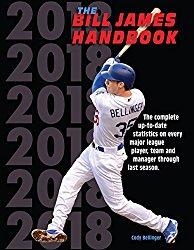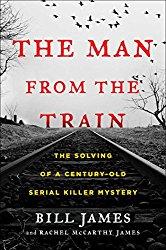
Bill James speaking (courtesy of my low quality camera phone)
Baseball statistician, Bill James, spoke at the University of Kansas last night as part of the James Naismith Lecture Series. I had the privilege of attending the lecture, which centered around “Transitioning from Naïve to Professional Research.” The talk was delightfully engaging, thought-provoking, and amusing.
If you’ve never seen him in person, Bill James is a big man. He stands over six feet tall with noticeably broad shoulders, and he a full head of hair and a large beard that only seems to add to him enormity. He is, of course, even bigger in the baseball world.

But James actually didn’t talk a lot about baseball. He couldn’t entirely avoid it, being such a prolific baseball writer and the founder of sabermetrics. He did talk about the determination of strong versus weak MVP pools, mentioning this article, which, among other things, argues that Eric Hosmer deserves to rank second in the AL MVP race over Aaron Judge. His statement noticeably surprised a lot of folks (and delighted a lot of folks; Lawrence is only about an hour from Kauffman Stadium, after all). “Eric Hosmer’s contribution to the Royals,” James said, “was greater than Aaron Judge’s contribution to the Yankees.” When he puts it that way, it makes sense.
James’s primary discussion, however, revolved around ideas. He compared ideas to seeds on a tree. The seeds of a tree scatter, and though are thousands upon thousands of seeds that can come off any given tree, if just one of them takes root and becomes another fully-grown tree, that is an astonishing percentage. 99.9% of trees seeds scatter and all they do is become food for animals or clog our sewers and gutters. In the same way, we as human beings come up with hundreds of ideas every single day, and the vast majority of those ideas are throwaways. But if one of those ideas takes root, it can potentially change the world.
Everything around us, he said, once started as an idea. “The Kansas Union was once an idea that somebody had. The University of Kansas was once just an idea that somebody had.” It’s a perspective-altering thought.

This isn’t everything that Bill James spoke about last night, but these are the ideas that particularly struck me. It was one of the more engaging lectures I’ve had the opportunity to attend, and I like to attend these kinds of things whenever I can. The fact that I’m a baseball fan certainly influenced my perspective, but as you can probably tell, it was the kind of talk that even non-fans could appreciate.

Bill James’s latest book




